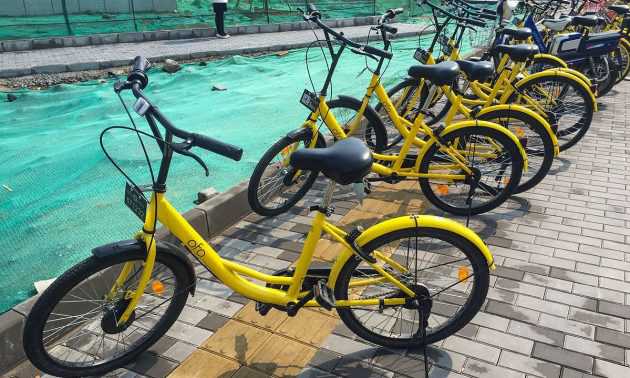Will Ofo ride out the winter or fall in the refund pothole?
20 December, 2018

Call it a bike run. Thousands of customers of Ofo, an ailing bike-sharing company, lined up outside its Zhongguancun headquarter on Monday to ask for a refund on their deposits.
Although the deposit was a tiny 199 yuan (US$ 28.86), more people joined in the queue after a news report that some users were able to get their deposit back after lining up on Sunday.
“This is the longest line-up I have ever been,” an Ofo customer posted in his WeChat account.
Some people in the line-up said they came because they were unable to contact customer representatives for more than a month, according to local reports. One said the amount was small, but it was worth a few meals.
It may take a long time to process the customers’ refund requests. In a Weibo statement, Ofo confirmed it was possible that the number of applications for deposit refunds would surge drastically due to its large user base.
The company will handle both online and queue-refund in chronological order, and asked its users to be patient and it pledged to settle the deposit refunds. More than 10 million Ofo customers registered for a refund online as of 10 pm on Tuesday.
That was a severe blow to the four-year startup which rode on the back of a co-sharing economy and all eyes will be looking if the once largest operator could survive the confidence crunch.
Originally a neat idea to provide the convenience of bike-riding and often the last mile for a destination, over a dozen players rushed to dominate the two-wheeled transport until it became a social problem because of the over-supply of bicycles which ended up in public areas in almost every major city.
In its heyday, Ofo deployed more than 10 million bicycles in 250 cities with more than 62.7 million monthly active users in 2017.
Half a dozen bike-sharing players went out of business in the last two years, while the remaining ones such as Ofo, funded by the Alibaba Group, its subsidiary Ant Financial, ride-sharing firm Didi Chuxing and consumer electronics Xiaomi Corp, was struggling to survive.
To survive, Ofo closed most of its overseas business and canceled the new market launch. This summer Didi and Alibaba Group offered a joint US$2 billion buyout, only to be rejected by founder Dai Wei.
Since October, Ofo has faced a flood of requests for user deposit refunds on top of lawsuits filed by its suppliers such as bike makers Shanghai Phoenix Bicycles and Tianjin Flying Pigeon Cycle Manufacturing as well as logistics services providers Best and Deppon Logistics.
In Hong Kong, Ofo changed its policy and started to allow users to pay their fares with their deposits. It sounded like a good policy to users but at the same time the company increased its charges, which are roughly double those of its competitors. From an accounting perspective, it was apparently trying to reduce liability and boost revenue within a short period of time.
Since Gobee.bike, founded by Frenchman Raphaël Cohen, ceased operations due to the “financial situation” in July, Ofo and Hobabike have become two major survivors in the bicycle-sharing sector. Both companies are suffering from high maintenance expenses, with many of their broken bicycles piling up on streets.
Although many people still believe Ofo is on higher ground as it is backed by Alibaba, it is unclear how the company would survive this cold winter if there are more refund requests.
TAG(s):
